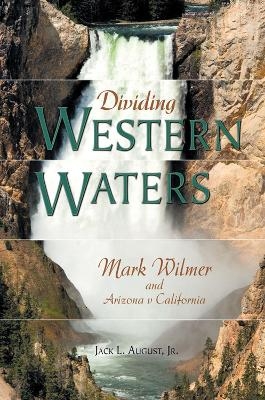
Dividing Western Waters
Mark Wilmer and Arizona v. California
Seiten
2007
Texas Christian University Press (Verlag)
978-0-87565-354-9 (ISBN)
Texas Christian University Press (Verlag)
978-0-87565-354-9 (ISBN)
- Lieferbar (Termin unbekannt)
- Versandkostenfrei
- Auch auf Rechnung
- Artikel merken
For Arizona, the seminal water case, Arizona v California, the longest Supreme Court case in American history (1952-1963), constituted an important step in the construction of the Central Arizona Project. This work looks at Arizona's herculean legal and political battle for an equitable share of the Colorado River.
The Scopes Monkey Trial, the Sacco and Vanzetti case, Brown v. Board of Education, and even subsequent televised high-profile murder trials pale in comparison to Arizona v. California, argues author Jack August in ""Dividing Western Waters"", August's look at Arizona's herculean legal and political battle for an equitable share of the Colorado River. To this day Arizona v. California is still influential. By the time Mark Wilmer settled in the Salt River Valley in the early 1930s, he realized that four basic commodities made possible civilization in the arid West: land, air, sunshine, and water. For Arizona, the seminal water case, Arizona v. California, the longest Supreme Court case in American history (1952-1963), constituted an important step in the construction of the Central Arizona Project (CAP), a plan crucial for the development of Arizona's economic livelihood. The unique qualities of water framed Wilmer's role in the history of the arid Southwest and defined his towering professional career. Wilmer's analysis of the Supreme Court case caused him to change legal tactics and, in so doing, he changed the course of the history of the American West.
The Scopes Monkey Trial, the Sacco and Vanzetti case, Brown v. Board of Education, and even subsequent televised high-profile murder trials pale in comparison to Arizona v. California, argues author Jack August in ""Dividing Western Waters"", August's look at Arizona's herculean legal and political battle for an equitable share of the Colorado River. To this day Arizona v. California is still influential. By the time Mark Wilmer settled in the Salt River Valley in the early 1930s, he realized that four basic commodities made possible civilization in the arid West: land, air, sunshine, and water. For Arizona, the seminal water case, Arizona v. California, the longest Supreme Court case in American history (1952-1963), constituted an important step in the construction of the Central Arizona Project (CAP), a plan crucial for the development of Arizona's economic livelihood. The unique qualities of water framed Wilmer's role in the history of the arid Southwest and defined his towering professional career. Wilmer's analysis of the Supreme Court case caused him to change legal tactics and, in so doing, he changed the course of the history of the American West.
Historian, Fulbright scholar, and native Arizonan, JACK L. AUGUST, JR., is director of the Arizona Historical Foundation and has served as a professor of history at Arizona State University and Prescott College. August has published extensively on the American West.
| Erscheint lt. Verlag | 30.11.2007 |
|---|---|
| Zusatzinfo | 59 b&w photos, bibliography, index |
| Verlagsort | Fort Worth |
| Sprache | englisch |
| Maße | 160 x 228 mm |
| Gewicht | 431 g |
| Themenwelt | Naturwissenschaften ► Biologie ► Ökologie / Naturschutz |
| Recht / Steuern ► EU / Internationales Recht | |
| Recht / Steuern ► Öffentliches Recht ► Umweltrecht | |
| Technik ► Umwelttechnik / Biotechnologie | |
| ISBN-10 | 0-87565-354-5 / 0875653545 |
| ISBN-13 | 978-0-87565-354-9 / 9780875653549 |
| Zustand | Neuware |
| Haben Sie eine Frage zum Produkt? |
Mehr entdecken
aus dem Bereich
aus dem Bereich


